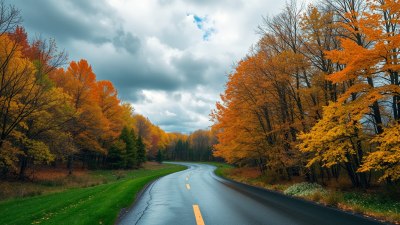What Makes the Air Suddenly Feel Like Soup Without Notice
Explore the factors that cause sudden humidity increases, making the air feel dense like soup. Understand the science and implications.

This image was created with the assistance of Freepik
Have you ever stepped outside and felt as if the air turned into a thick, heavy blanket, making each breath laborious? Most have experienced instances when the air suddenly feels dense and almost palpable, like a thick soup. This phenomenon can be attributed to various environmental and meteorological factors, and understanding these can enhance our awareness of climatic changes and weather predictions.
Understanding Humidity
At its core, humidity is the amount of water vapor present in the air. It plays a crucial role in our weather and climate systems. When humidity levels increase, our surroundings can feel warmer and heavier. This is because the water vapor reduces the efficiency of our sweat evaporation, leading to a state of 'saturation' where the air feels thick. The psychology behind feeling 'sticky' or 'sodden' due to high humidity also plays into the experience of the air feeling like soup.
Meteorological Factors
Several meteorological phenomena influence sudden spikes in humidity. One of the primary factors is the temperature. Warm air can hold more moisture than cold air, so if temperatures rise dramatically, they can amplify humidity levels. For instance, after a cold front, the temperature might spike, drawing in moisture from nearby bodies of water. This high humidity is often noticeable and results in that 'soup-like' air.
Weather Patterns and Systems
Weather systems contribute significantly to humidity changes. Low-pressure systems often bring moist air from oceans or lakes, which can blanket an area in humidity. These systems can lead to what meteorologists refer to as 'muggy' conditions. Additionally, warm fronts, moving into cooler areas, can create visible mists or fogs, further contributing to this sensation of thick air.
The Role of Geography
Geography also plays a pivotal role in how we experience humidity. Coastal areas, for example, often have high humidity due to evaporation from water bodies, which can become magnified by wind patterns. Mountainous regions can also trap moist air, leading to localized humidity spikes. Urban areas may experience the urban heat island effect, which can create pockets of warmth in cooler conditions, causing sudden increases in humidity.
The Impact of Seasonal Changes
Seasonal changes also affect humidity levels. Late spring and summer typically bring higher humidity as temperatures rise and storms develop. The humidity can feel particularly oppressive right before a storm, as the air becomes saturated with moisture, making it feel thicker. This seasonal pattern, combined with heat, can result in the air feeling dense and uncomfortable.
Human Activities and Humidity
Human activities can also influence humidity levels. Urbanization leads to heat retention, exacerbating humidity in cities. Pollution can alter weather patterns, potentially increasing localized humidity. Industrial activities, which release water vapor and other chemicals, can further contribute to heavy air. Awareness of environmental footprints and developing strategies to mitigate these effects are critical for greener living.
Climate Change Effects
Climate change intensifies many of these processes. As temperatures rise, more moisture enters the atmosphere, leading to increased humidity. This change can lead to more frequent and intense weather events. The consequences include not only discomfort but also health impacts, such as heatstroke when humidity levels rise excessively. Adapting to these changes is essential for public health.
Consequences of High Humidity
High humidity can have several consequences, including health effects and comfort issues. High humidity can impair thermoregulation, leading to overheating, dehydration, and heat-related illnesses. The impact on physical activities is notable as it can compromise performance and stamina. Additionally, humidity can contribute to discomfort at home or workplaces, prompting a need for air conditioning or ventilation solutions.
Why Does It Feel Like Soup?
The term 'soup-like' air refers not only to the thickness of humidity but also how it affects our senses. The sensation can also lead to diminished visibility, as high humidity contributes to fog and mists. This sensory overload can cause discomfort and even anxiety in some individuals, emphasizing the interconnectivity between weather and psychology.
Strategies to Cope with High Humidity
Managing the discomforts of high humidity is essential for individuals and communities. Staying hydrated is key as it helps regulate body temperature. Seeking shade or air-conditioned environments can alleviate some effects. Wearing loose-fitting and breathable clothing also promotes comfort, and using dehumidifiers indoors can reduce humidity levels, creating a more comfortable living space.
In summary, when the air feels like soup, it's often a convergence of various meteorological factors, geographical influences, seasonal changes, and human activities. Understanding these components can help us respond better to changes in our environment and may foster a deeper appreciation for the delicate balance of our climate system. Recognizing how our surroundings can affect us offers insights into how we adapt our lifestyles in periods of increased humidity and other weather changes.











